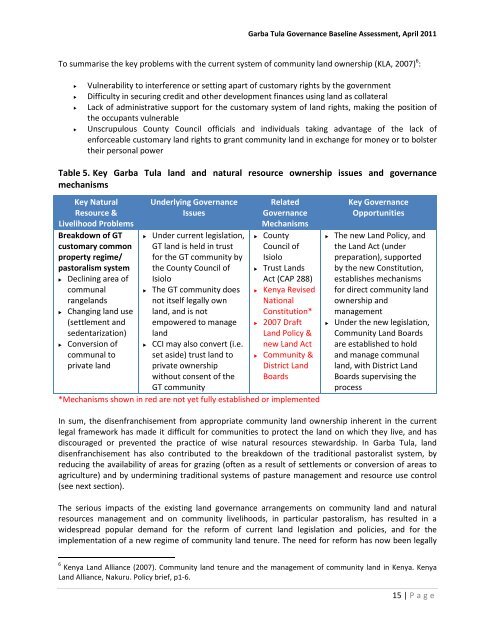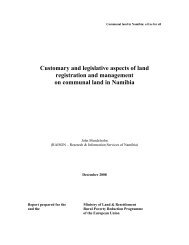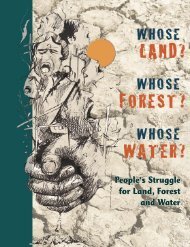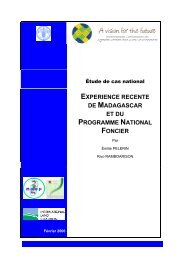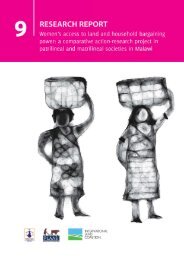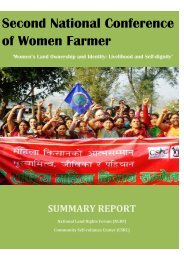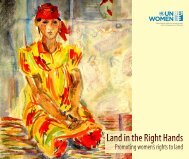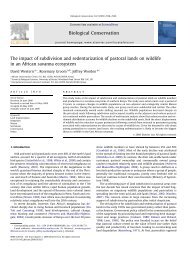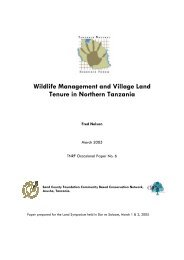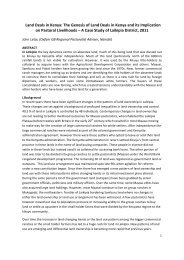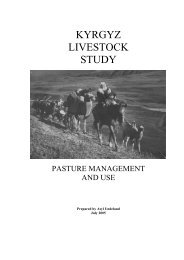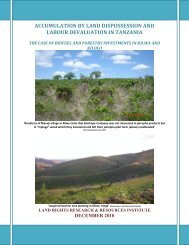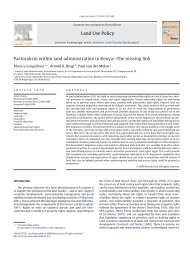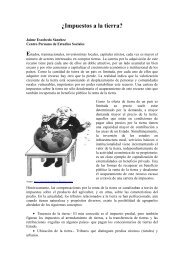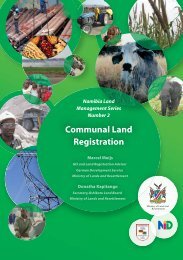Garba Tula Governance Assessment Final Report ... - Land Portal
Garba Tula Governance Assessment Final Report ... - Land Portal
Garba Tula Governance Assessment Final Report ... - Land Portal
Create successful ePaper yourself
Turn your PDF publications into a flip-book with our unique Google optimized e-Paper software.
<strong>Garba</strong> <strong>Tula</strong> <strong>Governance</strong> Baseline <strong>Assessment</strong>, April 2011<br />
To summarise the key problems with the current system of community land ownership (KLA, 2007) 6 :<br />
Vulnerability to interference or setting apart of customary rights by the government<br />
Difficulty in securing credit and other development finances using land as collateral<br />
Lack of administrative support for the customary system of land rights, making the position of<br />
the occupants vulnerable<br />
Unscrupulous County Council officials and individuals taking advantage of the lack of<br />
enforceable customary land rights to grant community land in exchange for money or to bolster<br />
their personal power<br />
Table 5. Key <strong>Garba</strong> <strong>Tula</strong> land and natural resource ownership issues and governance<br />
mechanisms<br />
Key Natural<br />
Resource &<br />
Livelihood Problems<br />
Breakdown of GT<br />
customary common<br />
property regime/<br />
pastoralism system<br />
Declining area of<br />
communal<br />
rangelands<br />
Changing land use<br />
(settlement and<br />
sedentarization)<br />
Conversion of<br />
communal to<br />
private land<br />
Underlying <strong>Governance</strong><br />
Issues<br />
Under current legislation,<br />
GT land is held in trust<br />
for the GT community by<br />
the County Council of<br />
Isiolo<br />
The GT community does<br />
not itself legally own<br />
land, and is not<br />
empowered to manage<br />
land<br />
CCI may also convert (i.e.<br />
set aside) trust land to<br />
private ownership<br />
without consent of the<br />
Related<br />
<strong>Governance</strong><br />
Mechanisms<br />
County<br />
Council of<br />
Isiolo<br />
Trust <strong>Land</strong>s<br />
Act (CAP 288)<br />
Kenya Revised<br />
National<br />
Constitution*<br />
2007 Draft<br />
<strong>Land</strong> Policy &<br />
new <strong>Land</strong> Act<br />
Community &<br />
District <strong>Land</strong><br />
Boards<br />
GT community<br />
*Mechanisms shown in red are not yet fully established or implemented<br />
Key <strong>Governance</strong><br />
Opportunities<br />
The new <strong>Land</strong> Policy, and<br />
the <strong>Land</strong> Act (under<br />
preparation), supported<br />
by the new Constitution,<br />
establishes mechanisms<br />
for direct community land<br />
ownership and<br />
management<br />
Under the new legislation,<br />
Community <strong>Land</strong> Boards<br />
are established to hold<br />
and manage communal<br />
land, with District <strong>Land</strong><br />
Boards supervising the<br />
process<br />
In sum, the disenfranchisement from appropriate community land ownership inherent in the current<br />
legal framework has made it difficult for communities to protect the land on which they live, and has<br />
discouraged or prevented the practice of wise natural resources stewardship. In <strong>Garba</strong> <strong>Tula</strong>, land<br />
disenfranchisement has also contributed to the breakdown of the traditional pastoralist system, by<br />
reducing the availability of areas for grazing (often as a result of settlements or conversion of areas to<br />
agriculture) and by undermining traditional systems of pasture management and resource use control<br />
(see next section).<br />
The serious impacts of the existing land governance arrangements on community land and natural<br />
resources management and on community livelihoods, in particular pastoralism, has resulted in a<br />
widespread popular demand for the reform of current land legislation and policies, and for the<br />
implementation of a new regime of community land tenure. The need for reform has now been legally<br />
6 Kenya <strong>Land</strong> Alliance (2007). Community land tenure and the management of community land in Kenya. Kenya<br />
<strong>Land</strong> Alliance, Nakuru. Policy brief, p1-6.<br />
15 | P a g e


